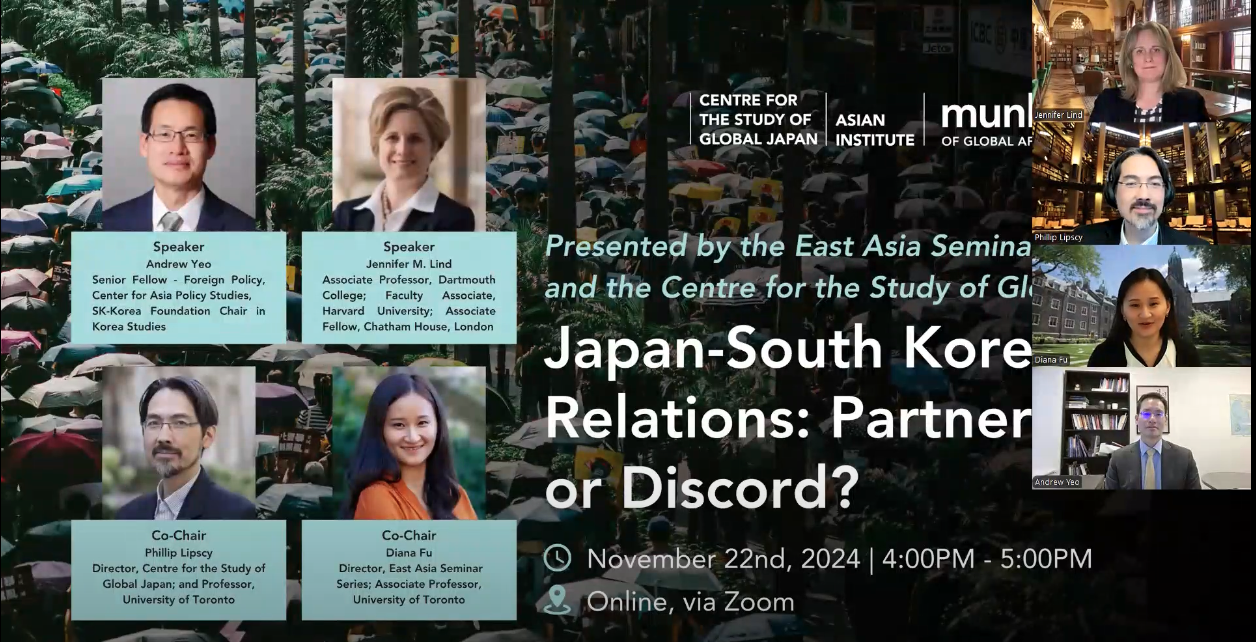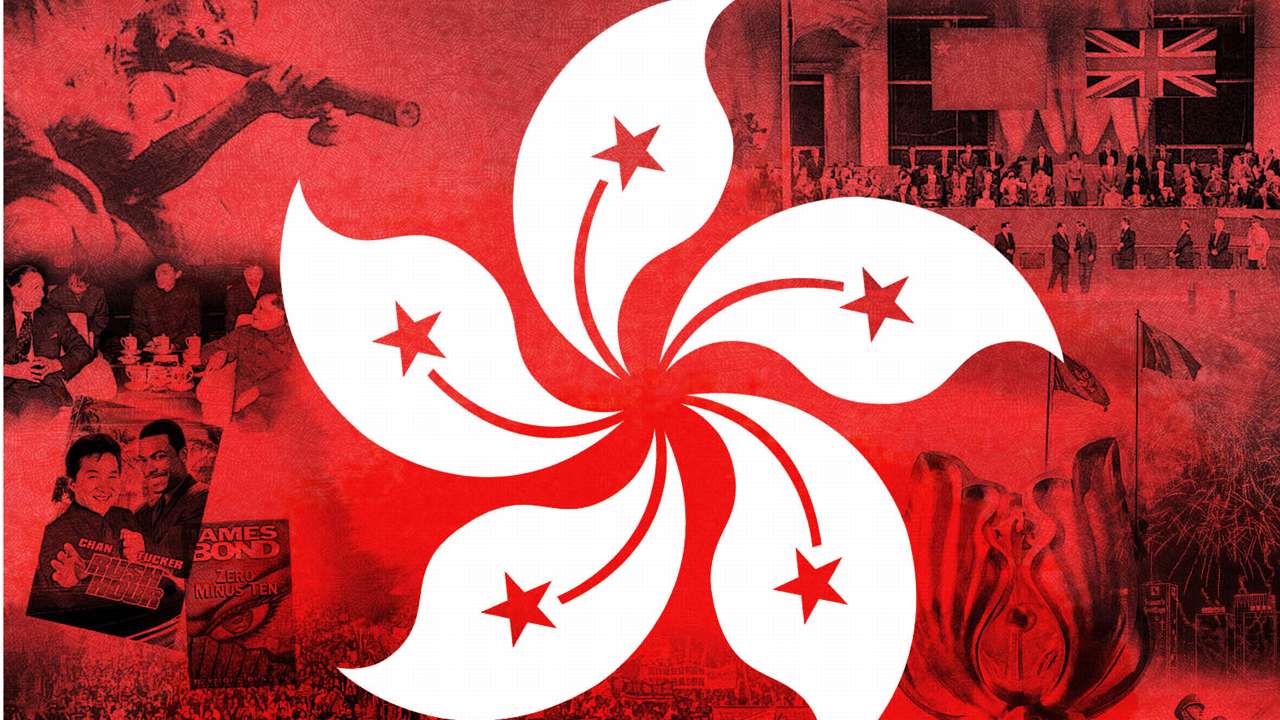On November 22nd, 2024, the Asian Institute at the Munk School of Global Affairs and the Centre for The Study of Global Japan held an online event as part of the East Asia Seminar Series titled “Japan-South Korea Relations: Partnership or discord?”. The invited speakers were Andrew Yeo, a senior fellow at the Brookings Institution’s Center for East Asia Policy Studies, and Jennifer M. Lind, an Associate Professor at the Department of Government in Dartmouth College.
Event Reporters Note: South Korea’s President Yoon Suk Yeol has since been impeached with an attempted self-coup, currently undergoing criminal trials. This event took place prior to these events which makes the third question out of date.
As allies of the United States, Japan and the Republic of Korea (ROK) have a history of conflict in historical and contemporary issues. Under the new governments of President Yoon Suk Yeol of ROK and Prime Minister Kishida Fumio of Japan, both countries have pursued rapprochement diplomacy to restore cordial relations. With new incumbent President Donald Trump in his second term, new Prime Minister Shigeru Ishiba, and interim acting president Choi Sang Mok, these leadership changes bring into question the prospects of this new cooperation initiative and its sustainability. This event will examine how each country will approach the intensifying tensions in the Indo-Pacific and what role to play inside the geopolitical contestation of disputed territories. Further, what will be the implications for Canada, as a close ally of the US, a NATO member, in relation to these matters?
The event started off by remarking the recent cooperative ties between South Korea and Japan—such as the US-ROK-Japan Trilateral Leaders Summit in 2023 and the sharing of sensitive military intelligence between the two historically hostile nations. These moves demonstrate that both countries are making a concerted effort to resolve economic and historical disputes by engaging in joint military exercises and creating a strategic trilateral alliance system. However, there is a question of the sustainability of this newfound cooperation and its ability to establish deeper, permanent ties despite government changes.
The first inquiry addressed by the event was “Can Japan and South Korea actually partner together as leading Asian democracies as a counterweight to China, or is their relationship too fraught to do so?”.
Professor Lind began by explaining the historical challenges in their interstate relations, specifically mentioning Imperial Japan’s war crime perpetration during WWII, such as extreme violence on citizens, forced labour, and sexual slavery (known as comfort women). Japanese leaders have historically demonstrated insensitive and hawkish behaviours since WWII, visiting Yasukuni shrines and downplaying their imperial atrocities in textbooks and political discourse. Such attitudes of Japan have served as perpetual obstacles to cooperation and reconciliation between the two nations. Although technically Japan has apologized, the apology has carried no weight in shifting Koreans’ perceptions about Japan due to the lack of true acknowledgement about past aggressions and continued offences such as whitewashing history.
A greater impediment to cooperation between South Korea and Japan is their divergent threat perception. Japan faces an ongoing territorial dispute with China and increasingly views China as a strategic threat. Accordingly, the U.S.-Japan alliance has evolved toward a posture of containing China. In contrast, ROK does not have a meaningful territorial dispute with China. Instead, China is one of South Korea’s largest economic partners and has significant influence over North Korea’s affairs—making stable relations with Beijing a diplomatic priority for Seoul. The ROK-US alliance, unlike its Japanese counterpart, is primarily focused on the North Korean threat rather than China. This divergence among treaty allies is a key factor to consider when analyzing the Japan-US-ROK relations. Since South Korea and Japan do not have a common threat perception, both bilateral and trilateral cooperation can be difficult to sustain.
Professor Yeo presented a glass half full perspective, arguing that the relationship between Japan and ROK has now moved beyond the familiar narrative of being perpetually strained. Despite domestic unpopularity, the Yoon administration’s effort to improve the relations with Japan have laid the groundwork for Seoul to become a bigger player in the Indo-Pacific region. Under his tenure, both the ROK- Japan bilateral and the ROK-Japan-US trilateral relations have significantly improved. While a future Trump administration may not prioritize trilateral relations to the same extent as the Biden administration, it is likely that he will still maintain this strategic alignment.
The second question was “Are there any specific areas you see as particularly promising for cooperation given the incoming significant political transition in the United States?”.
According to Professor Lind, despite Japan’s historically-insensitive actions in the past, Japanese politicians have gotten more disciplined about such contentious matters, in recognition that these actions are harmful to Japan’s foreign relations. Professor Yeo replied that security threats generated by North Korea and Russia often allowed leaders of both countries to discuss and cooperate on the issues, leading them to share information for mutual security. ROK and Japan have displayed strong cooperation when North Korea launched a inter-continental ballistic missile at the end of October. The two countries held bilateral meetings and shared radar information about missile launches from North Korea. Furthermore, both Japan and ROK are leading countries in Quantum Computing and Artificial Intelligence technologies, sharing interest in shaping the digital regulatory space. Lastly, both have trade dependent economies, with substantial reliance on supply chains of critical minerals, which creates a ground for economic cooperation and long-term bilateral relationships.
Both speakers agreed that this is a good moment in Japan-SK relations as the leaders have been quite pragmatic about the historical issues. To further improve the relationship, the two countries can economically and technologically cooperate in a way that does not pose a political threat to China. For instance, they can strengthen scientific and technological cooperation in green energies and enhance AI applications in healthcare together.
The third question asked, “Given that the Trump administration returns in a few months, are there any lessons that both countries have learned from their previous experiences?”
Both speakers agreed on several points. First, that Japan fared better negotiating with Trump in his first term. Second, the disparity in Trump’s treatment of Japan and South Korea is also noteworthy. South Korea, for instance, contributed approximately 2.8% of its GDP to defence—exceeding the NATO benchmark of 2% that many members still failed to meet. In comparison, Japan spent only 1% of its GDP on defence, a staggeringly low level of effort especially for a country that has active land disputes and perceives China as its primary threat. Despite this, it was South Korea—not Japan—whom Trump chastised. He notably pushed for the renegotiation of the Special Measures Agreement which upkeep the US military forces in Korea.
Ultimately, Japan-ROK relations have seen significant improvement, particularly regarding historical issues. With changing administrations in both countries—as well as in the United States—there is cautious optimism that the progress in bilateral and trilateral relations will continue into the future.
Danny is a third year student majoring in Philosophy, Contemporary Asian studies, and minoring in Bioethics. Born in South Korea, Danny has been passionate about Korea’s unique history in East Asian dynamics and the division mechanisms of the two Koreas. Danny will serve as Synergy’s 2024-2025 East Asia Event Reporter. He will be covering events specific to East Asia from the Asian Institute. His main research interests are National and International Relations that both Koreas navigate in their complex 38th parallel division, as well as the intra/inter dynamics between East Asia and the West. Through his work with Synergy, he hopes to shed light on the ever-changing complexities of the Korean peninsula and the cultural impacts of global events on East Asia.








